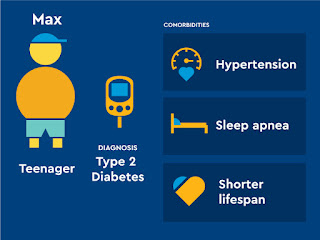In 2015, 30.2 million American adults had
diabetes, but only 23 million knew they had it, according to a report by the
Centers for Disease Control and Prevention. How can you be living with diabetes
and not know it?
Easy: Oftentimes you are totally asymptomatic.
“Either someone has no symptoms at all, or the
symptoms are not causing that much difference” from what is normal for them,
says Cleveland Clinic endocrinologist Leann Olansky, MD.
This often happens because type 2 diabetes is
caused by elevated levels of blood sugar, and if
your blood sugar levels rise slowly over time, you may not have or notice
symptoms, explains David Nathan, MD, director of the Massachusetts General
Hospital Diabetes Center.
However, there are warning signs you can be
aware of that may indicate you have type 2 diabetes. If you experience any of
the following symptoms, see your doctor. “It's important to get diagnosed as
early as possible, not only because of the risk of microvascular complications
[nerve, kidney, and retina damage] but also the risk of heart disease”
associated with type 2 diabetes, Dr. Olansky says. “A major killer of people
with diabetes is heart disease.”
Increased thirst and urination
“When
your blood sugar goes up, it goes into your urine, and the sugar draw more
fluid with it” so you tend to produce more urine, Dr. Nathan explains. This
means more frequent trips to the bathroom, excreting large volumes of urine at
a time, and consequent dehydration. People often notice this symptom as they
tend to get up more often during the night to use the bathroom.
Weight loss
Although not everyone experiences weight loss,
this can occur because you don't have enough insulin to keep your blood sugars
under control, and insulin is anabolic, says Dr. Olansky, explaining, “It helps
keep muscle and fat mass intact.”
High blood sugar in and of itself is linked with
fatigue, Dr. Olanksy says, and sleep disruption from frequently urinating at
night can make this worse. Type 2 diabetes may also cause fatigue because your
body has a hard time using sugar as a source of energy.
Blurred vision
 “Many
organs are permeable to glucose,” Dr. Nathan explains. “When blood sugar goes
up, it gets transported into the lens of the eye, causing it to swell. This
changes the refraction of the lens so it doesn't focus as well.” It can be
particularly hard to focus on things at a distance, Dr. Olanksy adds.
“Many
organs are permeable to glucose,” Dr. Nathan explains. “When blood sugar goes
up, it gets transported into the lens of the eye, causing it to swell. This
changes the refraction of the lens so it doesn't focus as well.” It can be
particularly hard to focus on things at a distance, Dr. Olanksy adds.
Tingling, numb, or painful feet or hands
Known as diabetic neuropathy, this condition
happens due to nerve damage. “When glucose is high, it gets into tissues that
aren't responsive to insulin. One is the lens of the eye, and one is the cells
that wrap around the nerves,” Dr. Olansky explains. When this happens in the
nerves, it causes damage, which leads to problems in nerve signaling.
Yeast infections
Although researchers aren't quite sure why,
women with type 2 diabetes tend to have more frequent yeast infections. “Sugar
in the tissues may decrease the ability to fight yeast, causing it to
overgrow,” Dr. Nathan says.
Increased hunger
When your body doesn't produce enough insulin or
use it effectively to transport sugar into your cells, your muscles and organs
lose energy, causing you to seek out calories for energy



No comments:
Post a Comment